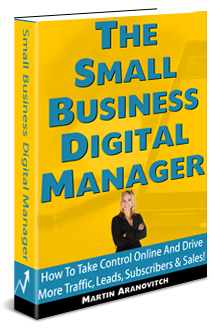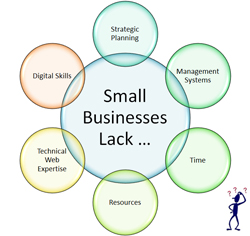

***
Why Small Businesses End Up With An Unmanageable Digital Presence
To grow and compete successfully in the Digital Information Age businesses need an effective digital presence, not just a website.
An effective digital presence puts businesses in control of their digital processes and allows them to get consistently better results.
Most small businesses, however, don’t have an effective digital presence. What they often end up with instead is an online presence that is unmanageable and underutilized.
Let’s see why this happens …


Small businesses typically take their business online by getting a website developer to build them a website …


Now that their website is set up, the business needs to look for ways to drive more visitors and generate more leads. Normally, this involves setting up social media pages in addition to their website …
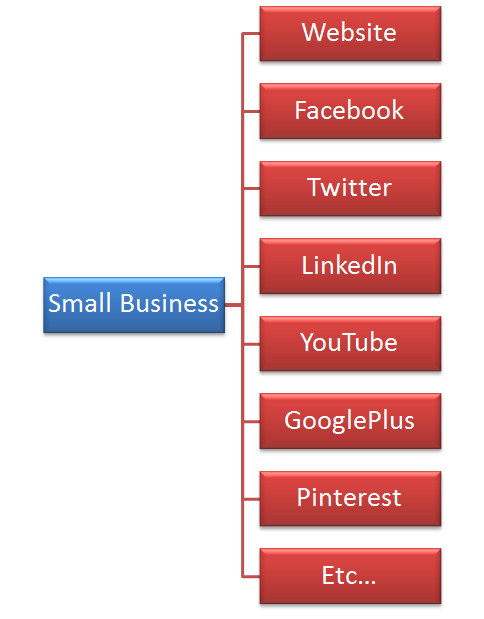

The business now has a website and social media pages. Unless their purpose is to sit passively in cyberspace to give the business ‘credibility,’ these need to become ‘online assets’ and help the business get better results.
This is where things start to become unmanageable for most small businesses.
Increasing business exposure online, driving traffic, generating leads, converting visitors into customers, sales, and subscribers, ranking higher in search engines, attracting followers on social media, etc. involves doing a lot of work on a regular basis to create results.
Not only does the website need ongoing work in areas like content publishing, website management, and online marketing …
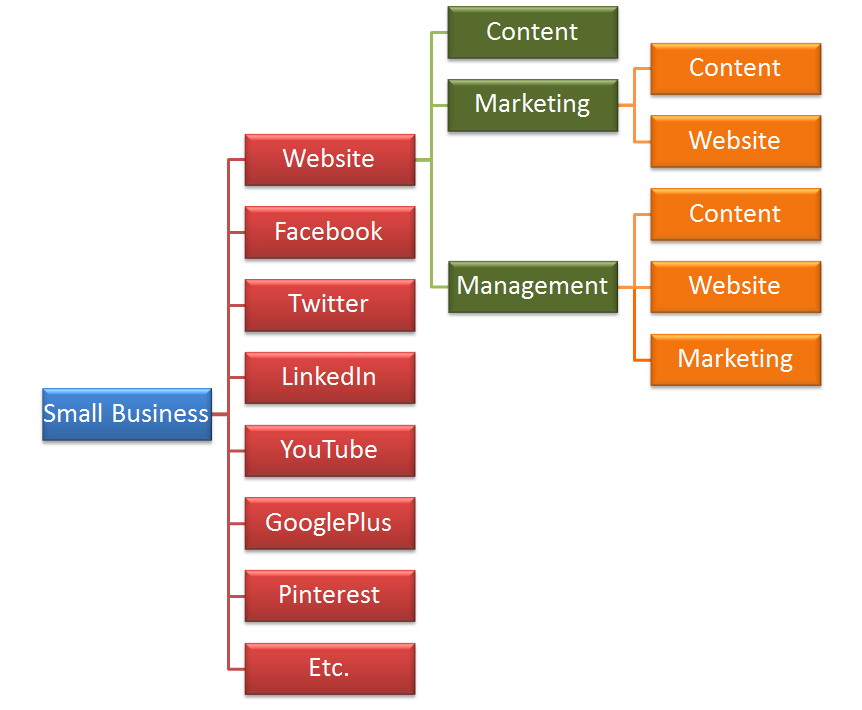

Social media pages also need content, management, and marketing …
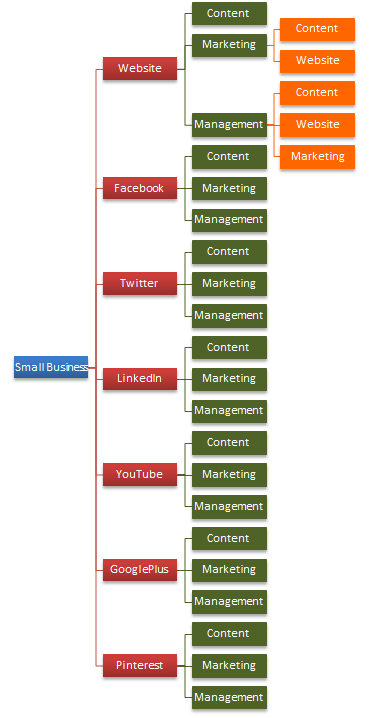

Let’s take a look at some of the work a small business needs to do on a regular basis in these areas.
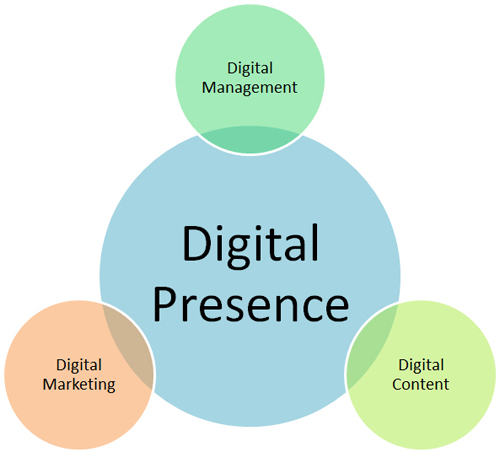

Digital Management
Businesses need to maintain, update, manage, and keep their website, web server, hardware devices, software, digital assets, online properties, and service accounts (logins, subscriptions, license renewals, etc.) secure.
This means performing regular backups, updates, upgrades, as well as troubleshooting issues and fixing problems, reviewing and updating web content (e.g. product and user information, etc.), managing users, providing customer support and training, and a whole lot more …
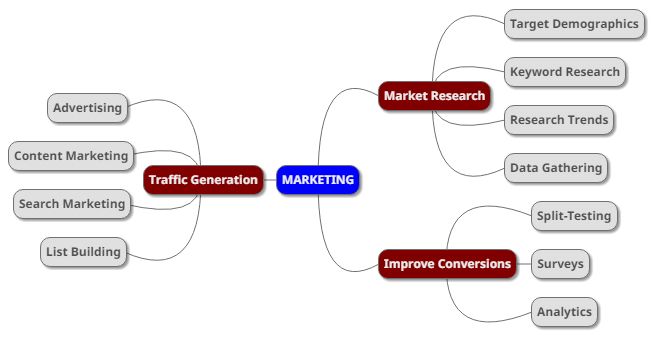

(An effective digital presence requires ongoing digital management)
Digital Content
Websites, blogs, social media pages, newsletters, etc. need regular content. Digital content also needs to be managed and periodically reviewed and kept up-to-date.
Creating high-quality content for articles and blog posts, videos, graphic images, audios, downloadable reports, etc. is time-consuming and involves a great deal of work in areas like planning, researching, collating/organizing information, writing, scripting, editing, reviewing, producing/formatting, uploading, publishing, updating, etc. …
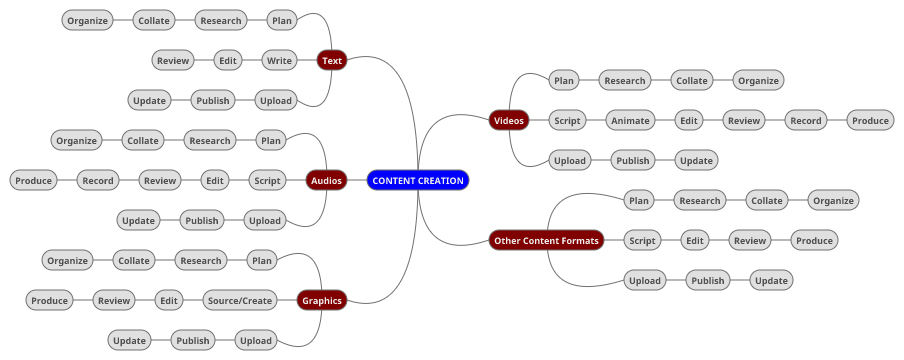

(An effective digital presence requires ongoing digital content creation)
Digital Marketing
Businesses need to continually market and promote themselves online to stay relevant.
Improving search results, driving more traffic to their website and social media pages, generating leads and subscribers, converting more visitors into customers and sales, and gaining a competitive edge involves coordinating many different marketing activities and requires understanding the market, the competition, the needs of the target audience, and finding cost-effective ways to get your message through to consumers with limited attention spans who are blind to most forms of online advertising …
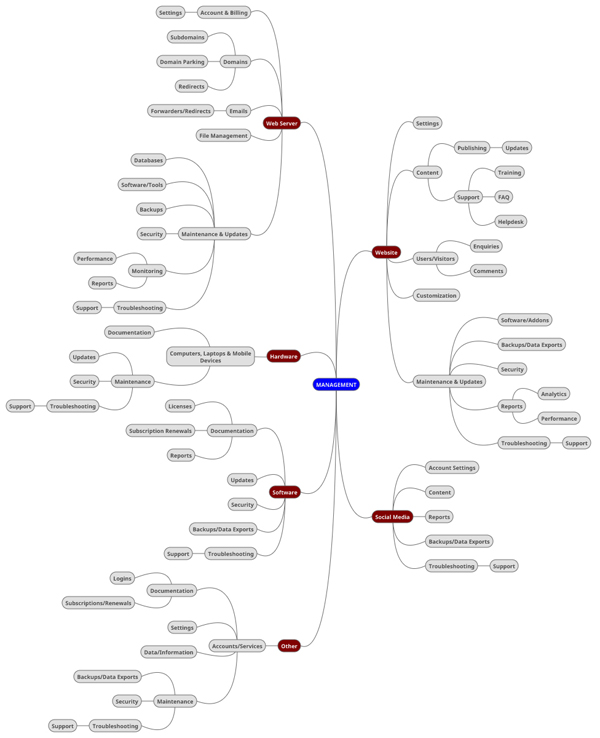

(An effective digital presence requires ongoing digital marketing)
But it doesn’t end there …
An effective digital presence consists of more than just a website and social media pages. It involves integrating other digital presences (e.g. search, mobile, local), which also require strategic planning and effective systems, as well as management, content, marketing, etc. …
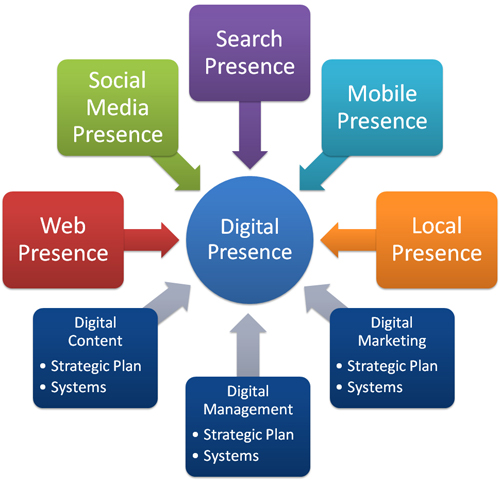

(An effective digital presence is more than a website)
Each of these ‘presences’ presents a myriad of options, challenges, decisions, and opportunity costs and require a significant investment of time, money, and resources to deliver results.
Which Opportunity Is Worth Pursuing?
Have you ever participated in a small business networking event where at some point, someone asks for suggestions on ways to improve their business and get better results?
Often, what happens is that a spirited discussion ensues where other business owners start throwing around loads of helpful ideas and suggestions:
- “Start a blog!”
- “Write articles with catchy titles like ‘The 10 things you need to know about …!'”
- “Record videos using your phone and post them on YouTube!”
- “Create 15-30 minute podcasts!”
- “Research your competition online and do what they’re doing!”
- “Help people on forums!”
- “Build a following on social media!”
- “Follow people on Twitter and they’ll start following you back!”
- “Spend 15-30 minutes every morning posting useful tips on Facebook and Twitter!”
- “Start a Facebook group!”
- “Don’t forget LinkedIn!”
- “Start running webinars!”
- “Facebook Live is better!”
- “Don’t forget Instagram!”
- “And Snapchat!”
- “What about taking up ads on Google and Facebook?”
- “Build a list!”
- “Start a newsletter!”
- “Write an eBook!”
- “Why don’t you create an online course?”
Businesses today have the option of promoting and marketing themselves on different social networks (e.g. Facebook, Twitter, YouTube, LinkedIn, Pinterest, etc.) using many different methods (i.e. tactics), such as paid ads, video ads, promoted posts, etc.
Every method is an opportunity. Opportunities, however, cost time and money and not every opportunity is worth pursuing.
Which method(s) will you use to promote your business? What’s the best way to start and where do you go from there? What criteria will you use to make decisions? How will you evaluate your results?
Posting content on blogs and social media, creating videos, podcasts, newsletters, and e-books, running webinars and online courses are all great ideas but they are not strategies.
Strategies vs Tactics
Building a successful business online requires planning and strategies, not just a loose collection of tactics.
Wikipedia defines the difference between tactics and strategies as follows …
“Strategy is undertaken before the battle. Tactics are implemented during battle. The terms tactic and strategy are often confused: tactics are the actual means used to gain an objective, while strategy is the overall campaign plan, which may involve complex operational patterns, activity, and decision-making that lead to tactical execution.”
Source: https://en.wikipedia.org/wiki/Tactic_(method)
If we think in terms of business being like war, then tactics are what you do in the middle of the battle to survive. Your strategy, on the other hand, is how you prepare to win the war. A strategy requires you to explore your options, know your strengths, assess your resources, and decide which tactics best suit your options, strengths, and resources before even going into battle.
A strategy also gives you a better idea of which battles you should fight or avoid and which tactics you should or should not consider using.
If your business lacks strategic planning and systems to:
- Manage your digital presence,
- Monitor, measure, review, and analyze your online marketing activities, and
- Improve your digital processes and get better results,
Then …
- How can you truly evaluate which opportunity is worth pursuing within your limited resources, and
- Who is going to perform and manage all of the time-consuming work involved in creating results for whatever opportunity you decide to pursue?


(Who is going to do all the time-consuming work to grow your business online?)
For most small businesses, the answer seems obvious … outsource it!
Let’s see, however, how outsourcing can lead small businesses to end up as ‘hostages’ of their outsourced service providers …
*** end of excerpt ***
Download "The Small Business Digital Manager"
(The Small Business Digital Manager)
***
"This is AMAZING! I had learnt about how to use WordPress previously, but this covers absolutely everything and more!! Incredible value! Thank you!" - Monique, Warrior Forum
***

